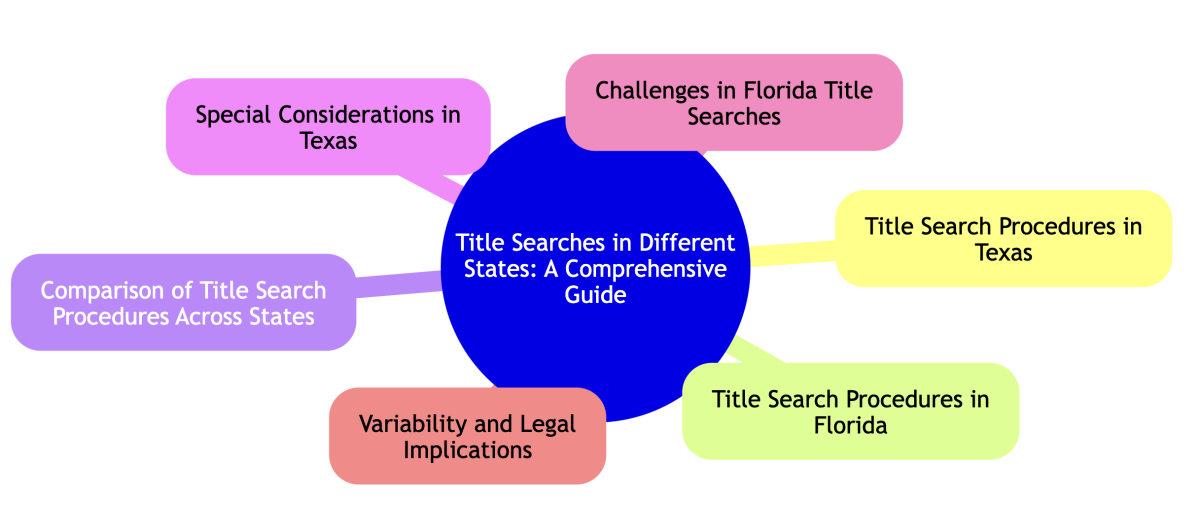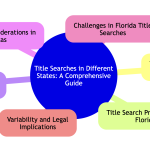Introduction: Comparing Title Searches by State
A title search reveals a property's actual legal standing.
Unpaid taxes, easements, boundary discrepancies—there are many things buyers and sellers must consider. Property title reports lay it all out in the open so no one is surprised after the sale.
This article from Illinois title search company, Title Search Direct highlights the factors that vary across states by examining local requirements from Texas, Illinois, California, and Florida.
Key Insights
- Scope Varies by State: The depth and scope of title searches can vary significantly depending on state-specific laws and practices.
- Public Records are Key: Essential documents in a title search include deeds, court records, and local government filings.
- Professional Help is Advisable: While DIY searches are possible, professional title searchers have the tools and knowledge to navigate complex records.
- Potential Issues: Common issues uncovered during title searches include unpaid taxes, easements, and claims from previous owners.
- Protection via Insurance: Title insurance protects against potential financial losses from defects found after purchase.

Understanding Title Searches
Title searches are an essential step in the property-buying process.
They uncover any legal encumbrances or claims that might jeopardize your right to ownership.
A title search involves scrutinizing public records to track the property's history and guarantee the seller has the legal right to transfer ownership.
The necessity of a title search is universal, but the specific procedures and required documents can differ widely from one state to another. This variance largely depends on local laws and the availability of records, often necessitating a nuanced approach to each search for comprehensive coverage of all potential issues.
The Importance of a Title Search
- Legal Assurance: Confirms that the seller legally owns the property and can transfer ownership without legal hindrances.
- Uncover Liabilities: Reveals any existing mortgages, liens, or encumbrances that could affect your use or ownership of the property.
- Protection Against Claims: Helps avoid potential claims from third parties or disputes over property boundaries.
- Mandatory for Insurance: Necessary for obtaining title insurance, which lenders typically require to protect against future claims.
- Peace of Mind: You can rest assured that the property you are buying will not come with unexpected legal baggage.
Document Types Reviewed During a Title Search
During a title search, searchers examine various documents to ensure the property's title is clear and transferable. Here are the key types of documents they typically review:
Deeds
A deed is an essential document that transfers property ownership from one party to another. Title searchers meticulously check all previous transfers captured by deeds to confirm that each was legally conducted and adequately documented. This verification ensures the property ownership chain is uninterrupted and legally sound.
Liens
Liens are claims against a property that must be cleared before a sale can proceed. They may arise from unpaid debts such as taxes, contractors' fees, or other obligations. A title search uncovers existing liens to ensure their resolution, thus preventing future legal disputes over the property.
Easements
Easements allow others to use the property for specific purposes, such as utilities or access. Identifying easements is crucial as they can significantly impact how the property is used and influence its value and utility.
Other Documents
Title searchers also review other critical documents during a title search, including wills, divorce decrees, and tax records. This comprehensive review uncovers any potential claims or disputes related to the property. For instance, wills and divorce decrees can affect ownership rights, while tax records can reveal if there are outstanding obligations that could encumber the property.
Title Search Procedures in Illinois
In Illinois, a title search is meticulous and designed to uncover any legal or financial issues tied to the property.
Title searches must ensure the property title is clear of any liens, disputes, or encumbrances that might complicate your purchase.
- Access County Records: Title searchers access public records from the county where the property is located.
- Review Historical Documents: They review historical deeds, court records, and property indexes.
- Check for Liens and Encumbrances: It is important to check for any outstanding liens, loans, or unpaid taxes.
- Examine Court Judgments: Searches include looking for any court judgments that might affect ownership, such as bankruptcies or probate issues.
- Verify Legal Ownership: Confirm the legal owner and show no disputes over property boundaries or ownership.
Title Search Procedures in California
California’s robust title search procedures reflect the state’s comprehensive legal frameworks governing real estate. Here’s what you can expect:
- Comprehensive Public Records Check: Title searchers examine a variety of public records to compile a history of the property.
- Detailed Examination of Past Sales: Every property transaction is scrutinized to guarantee no irregularities could affect future ownership.
Table: Types of Public Records Accessed in California
|
Record Type |
Description |
|
Deed Records |
Documents ownership transfers |
|
Tax Records |
Details tax status and any delinquencies |
|
Court Records |
Includes any litigation involving the property |
|
Local Liens |
Lists local government liens for utilities or assessments |
Online vs. In-Person Searches
Online Searches
In California, many counties have digitized their records, allowing for faster and more efficient online searches. These databases typically include deeds, mortgages, and lien records.
In-Person Searches
Despite the availability of online resources, some searches may require a visit to local government offices, especially for older records not available digitally or to confirm details found online.
Title Search Procedures in Texas
In Texas, title searches are a critical component of the real estate transaction process, known for their unique consideration of mineral rights along with standard property assessments.
This involves a detailed review of public and private records to determine whether the property's title is clear of any encumbrances that might impact ownership.
- Public Record Examination: Review deeds, court records, and liens so everything runs smoothly.
- Mineral Rights Check: Special attention is given to mineral rights, which can be owned separately from the land.
- Tax Status Verification: Confirm that all property taxes are up-to-date, which is crucial in avoiding future legal complications.
Comparison Table: Title Search in Texas vs. Other States
|
Feature |
Texas |
Other States |
|
Mineral Rights |
Always checked |
Seldom checked |
|
Public Records |
Extensive access |
Limited access |
|
Tax Verification |
Mandatory |
Varies |
Special Considerations in Texas
Mineral Rights
Unlike many other states, Texas has mineral rights that can be a major factor in property transactions. These rights can be sold or leased separately from the land, potentially affecting the property's value and usage.
Water Rights
Given the state's size and agricultural significance, water rights are also thoroughly reviewed during title searches to ensure there are no disputes over water use.

Title Search Procedures in Florida
Florida's title search procedures are notably meticulous, reflecting the state's susceptibility to issues like flooding and hurricanes. These environmental factors are considered alongside traditional checks to provide a comprehensive understanding of the property's legal standing.
- Detailed Records Check: Scrutinizes deeds, liens, and court records for completeness.
- Environmental Concerns: Special checks for flood zones or hurricane impact areas.
- Lien Searches: Focuses heavily on identifying any mechanics' liens due to the state's active construction industry.
Comparison Table: Title Search in Florida vs. Other States
|
Feature |
Florida |
Other States |
|
Environmental Checks |
Required |
Not required |
|
Lien Searches |
Extensively checked |
Standard check |
|
Flood Zone Checks |
Mandatory |
Rarely required |
Challenges in Florida Title Searches
Hurricane Impact
Properties in hurricane-prone areas require checks for any disaster-related damages or claims that could affect the title.
Complex Development History
Florida's rapid development and frequent renovations increase the complexity of title searches, often revealing multiple layers of ownership and claims.
Comparison of Title Search Procedures Across States
Comparing title search procedures across states like Texas and California reveals differences in legal requirements and environmental considerations. This variability can significantly impact the approach and outcomes of real estate transactions.
Variability and Legal Implications
State Laws
Each state's laws dictate specific requirements for title searches, influencing everything from the documents reviewed to the potential legal ramifications of findings.
Environmental and Economic Factors
Local environmental issues and economic activities, such as mining in Texas or tourism in Florida, play a crucial role in shaping title search protocols.
Conclusion - Your Trusted Title Search Company
Anyone interested in real estate should at least be familiar with the common requirements of a title search.
Learning the differences between states could be beneficial one day.
Buying property is exciting. Many things will occupy your mind when looking at new land—why not let an experienced Title search company make it easy for you?
For those looking to secure their investment or conduct real estate transactions, turning to reputable resources like Title Search Direct ensures that you are well-informed and prepared to make sound decisions in the property market.




